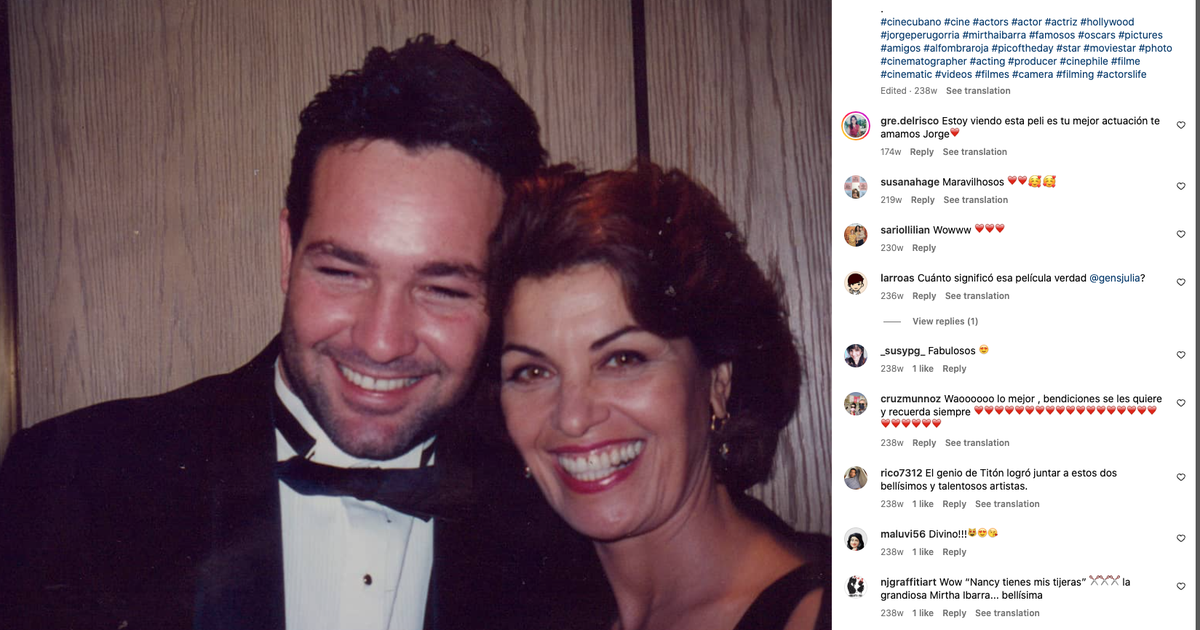HAVANA.- When the film “Strawberry and Chocolate” was released in 1993 in Cuba, the public experienced a “catharsis between applause and tears”, then the country moved towards the recognition of homosexuals, but in terms of freedom of expression it has “regressed”, reflect Jorge Perugorríaprotagonist of this story.
On the 30th anniversary of this film, which marked a before and after in Cuban cinematography, the 58-year-old actor speaks with AFP alongside his cast mates, in an emotional reunion at the La Guarida restaurant, a mansion of early of the 20th century in Central Havana that was subdivided by the regime into homes and served as the setting for the film.
The International Festival of New Latin American Cinema, held in Havana, will pay two tributes to this film, which was long applauded at its premiere.
There was “a collective catharsis,” recalls Perugorría, on the terrace of the place.
“It was as if the public had the need to have seen that film (…) because it perhaps dealt with what many had in their heads (…), frustrations, that series of themes that had taken a long time” to come to light. social conversation, remember.
Cuba was then fully entering the “special period”, a severe economic crisis due to the withdrawal of Soviet support for the island, and was also experiencing the blow of a dark policy, applied 20 years earlier, that marginalized homosexuals and those who dissented politically.
The film portrays this context through the story of Diego, a refined gay art lover, who in an environment of censorship and homophobia forms a friendship with David, a staunch defender of the ruling Communist Party.
“Differences”
“That final hug” between Diego and David at the end of the film “is a song, a reconciliation between Cubans,” but “it is further away today than it was 30 years ago,” says Perugorría, who plays Diego.
“The differences between Cubans have opened up,” and the hug “has become an almost impossible metaphor,” he adds.
For Vladimir Cruz, 58 years old and who played the role of David, with this film not only “the repressed were identified, but the repressors.”
“We had experiences of people leaving the cinema and saying: ‘I have acted like this, I have been intolerant, I have repressed homosexuals,'” Cruz recalls between photos and sculptures that the establishment preserves from the set.
This story shows how “the right to participate in society was taken away from those who thought differently. And in that sense I believe that Cuban society as a people has progressed, but at the official level we have gotten worse,” Cruz estimates.
The actor celebrates the legalization, in 2022, of equal marriage. “But anyone who thinks differently, one millimeter from the predominant ideology or the official ideology, continues to suffer the same problems that Diego had and that led him to migrate,” he says, at a time when Cuba faces a wave of migrants without precedents.
Perugorría agrees: “today, just as Germán’s exhibition (another character in the film) was censored in the film 30 years ago, they continue to censor films and exhibitions.”
Cuba requires “a cultural policy that is for everyone in our diversity, our complexity, not just for a group that thinks in one way,” says Perugorría.
“Love for cinema”
“‘Strawberry and Chocolate’ advocates for that” and remains “current (…) especially in respect for tolerance and respect for difference, that is, unfortunately, there we have devolved a little.”
He cites the case of the more than 300 young people who carried out an unprecedented protest for freedom of expression in November 2020. A good part of them emigrated.
“It’s sad to think that there are people who don’t leave, it’s just that they throw them out, because they corner them, they harass them,” he says.
Behind the scenes, another fraternal story was built between Tomás Gutiérrez Alea (1928-1996) and Juan Carlos Tabío (1943-2021), co-directors of the film.
Seriously ill, Gutiérrez Alea underwent surgery during filming, but four days later he returned to filming. The actors say that he slowly climbed the wide stairs of the house to direct in the mornings. Then Tabío followed his friend’s recommendations in detail on set.
“That story of friendship between these two great artists and love for cinema also had a lot of weight within the film,” considers Perugorría.
Mirta Ibarra (77 years old), who had a co-starring role in the film and is Gutiérrez Alea’s widow, says that it was a very hard moment due to her husband’s illness.
“It was a pain, I have to say.” In the car on the way to the set, Gutiérrez Alea asked them to head towards the Malecón: “‘I want to see the sea, see the beautiful areas of Havana,'” he said, because “he thought it was his last film,” Mirta recalls sadly.
Source: AFP

